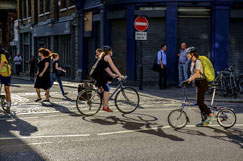Labour-controlled unitary authorities in England are more likely to implement conservative Government policy supporting cycling, new research has found.
Nottingham Business School said Labour authorities were also more likely to be able to measure their support of cycling, more likely to be among the higher spenders on cycling support schemes, and on average spent around 50% more than their Conservative counterparts.

Researchers pointed out that despite successive Conservative-led governments stating their commitment to cycling and providing cash, cycling rates in the UK remain low, with fewer than 5% of journeys being made by bicycle despite the relatively short distance of a typical car journey in cities.
Researchers Dr Seamus Allison and Aoife Allison made freedom of information requests to 55 English unitary authorities, requesting data on populations served, total spend on road transport projects and total spend on cycling infrastructure projects over the last five years.
Only 24 provided data, with 19 authorities stating that they did not separately record the spend on cycling infrastructure projects, and the remainder failing to respond.
Dr Allison said: ‘Given the UK Government's stated policy to encourage greater levels of cycling in England, the data suggests that, at a local level, Conservative controlled authorities appear not to support central Government's ambitions.
‘To achieve its stated objectives the Conservative Government appears to rely on Labour controlled authorities to implement its policies.'
Fourteen of the 24 authorities had been Labour-controlled over the last five years, eight Conservative controlled and two were controlled by independents.
Of the top ten spending councils, measured by spend per head of population on cycling schemes, seven were Labour-controlled.
On average the Labour-controlled authorities spent around 50% more per head of population on schemes to encourage cycling than Conservative authorities. The Labour authorities were more likely to spend above the national average per head on such schemes.
The 24 Labour-controlled authorities were also more likely to be able to measure and report on their financial support of cycling schemes and more likely to have such data for the full five-year period.
































